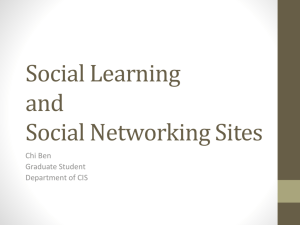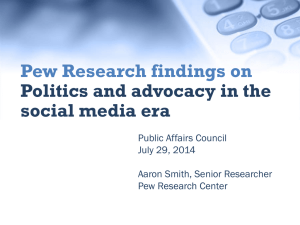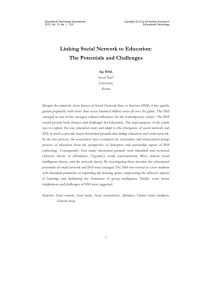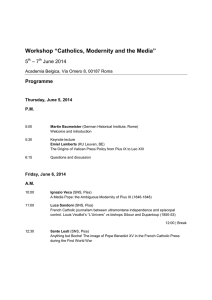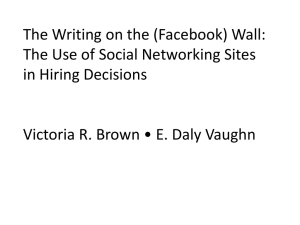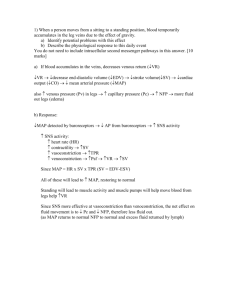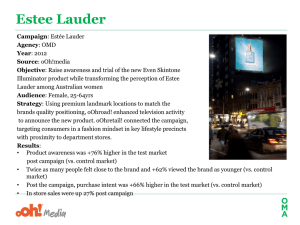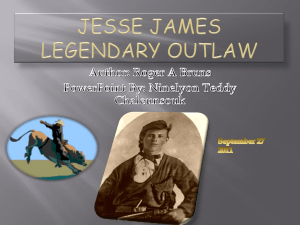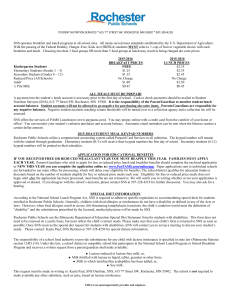Digital Politics - Pew Internet & American Life Project
advertisement
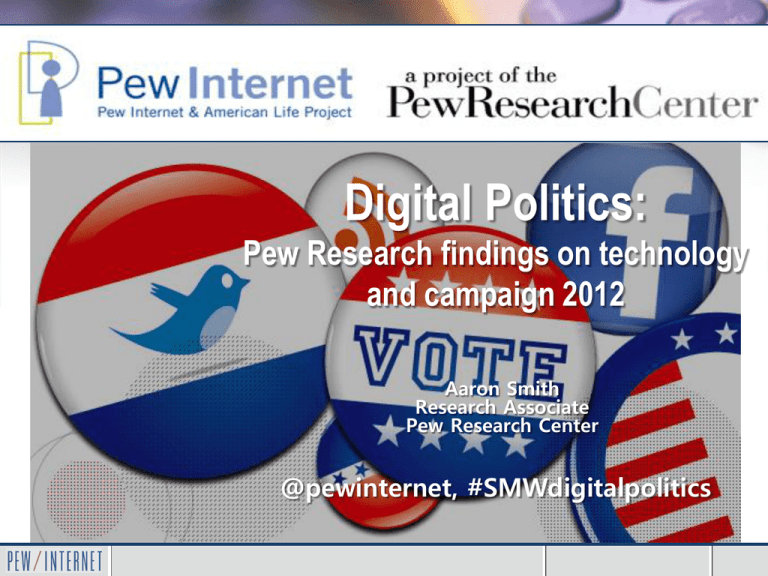
Digital Politics: Pew Research findings on technology and campaign 2012 Aaron Smith Research Associate Pew Research Center @pewinternet, #SMWdigitalpolitics • Part of the Pew Research Center, a nonpartisan “fact tank” based in Washington, DC • PRC’s mission is to provide high quality, objective data to thought leaders and policymakers • Data for this talk is from nationally representative telephone surveys of U.S. adults (on landlines and cell phones) • For 10 years of digital politics data, see our “Politics” topic page at www.pewinternet.org Who uses which social networks, and what do they do there? 6 in 10 American Adults use a SNS 2008: 33% 2008: 6% SNS use by party/ideology Ideological “profile” of SNS users 2/3 of SNS users are politically active on these sites (that’s 1/3 of all adults) Social media engagement 60% of American adults use social networking sites such as Facebook or Twitter. These are some of the civic activities they engage in on these sites. % of SNS users who have done this % of all adults who have done this 38% 23% Encourage other people to vote 35 21 Post your own thoughts/comments on political or social issues 34 20 Repost content related to political/social issues 33 19 Encourage others to take action on political/social issues that are important to you 31 19 Post links to political stories or articles for others to read 28 17 Belong to a group that is involved in political/social issues, or working to advance a cause 21 12 Follow elected officials, candidates for office or other public figures 20 12 “Like” or promote material related to political/social issues that others have posted Source: Pew Research Center’s Internet & American Life Project, July 16-August 7, 2012 Tracking survey. N=2,253 adults ages 18 and older, including 900 interviews conducted on respondent’s cell phone. Margin of error is +/-2.4 percentage points based on all adults. Young folks tend to stand out on most metrics …but among SNS users there aren’t many partisan differences % of SNS users who did the following during the 2012 campaign… Who cares? They’re not out there working for real change, man. 1. Actually, they’re doing lots of things that people have done offline for years (“vote for my candidate”, “support my issue”, “this is important”) 2. More to the point, there is a TON of overlap between online and offline political activity. Some people do political activities on social networks and nowhere else, but they are a pretty small minority. 3. People who are politically active on social networking sites are highly engaged in the political process (on a range of metrics) compared with other groups. 4. Obligatory disclaimer: correlation is not causation, and one-time surveys are not suited to uncovering directional impacts. 5. But when we ask directly, 25% of SNS users say they have gotten more involved in a political or social issue after reading about it on a social networking site. The filter bubble* is complicated: people are learning new things about friends’ political beliefs… But ideological self-sorting is taking place, especially among the most committed And people are also reinforcing beliefs and content that they approve of A few other notes on ideological self-sorting 1. It’s incredibly difficult to disentangle technology-driven “self-segregation” from the broader trends towards increased polarization in the culture at large. 2. We see this behavior in lots of other places, not just social networks (TV news sources, trust in different news orgs, etc etc). 3. Ordinary users have complicated views on the subject. They like how it impacts them (“I can find other people who share my views and talk to them!”) but worry about the big-picture implications for others (“It helps the loudest voices dominate the public debate!”) Political talk in social spaces can also lead to drama and annoyance Who gets the boot? Mostly (but not always) friends-of-friends 67% of those who blocked, unfriended, or hid someone on a social networking site did it to a distant friend or acquaintance 31% did it to someone they had never met in person 31% did it to a close personal friend 21% did it to a coworker 18% did it to a member of their family Other interesting “internet and politics” related findings Social networks and campaign news 12% of Americans regularly got campaign news from Facebook by October 2012, up from 6% in January That puts Facebook roughly on par with national newspapers, NPR and late night comedy shows as a campaign news source Ultimately, no single platform dominates the campaign news game—just 6% of Americans say that they turn to only one source for campaign info 55% of registered voters watched online political videos in 2012 Political videos spread through (online and offline) word of mouth Mobile Politics 88% of registered voters own a cell phone and… 27% of them use their phone to keep up with election news or political issues in general ¾ of these cell owners use text messaging and… 19% texted with friends or family about the election 5% signed up to get text messages directly from a candidate or campaign 5% got unwanted political texts that they didn’t sign up to receive Half of these cell owners have a smartphone and… 45% use it to read about the election on social networking sites 35% use it to “fact check” statements they heard during the campaign 18% used it to post their own comments about the election on a SNS Dual-screen experiences Among 18-39 year olds: 67% only on TV, 10% only on computer or mobile device, 22% on TV and other screen All told, half of all cell owners are “connected viewers” who use their phones to do things like fact-check things they’ve heard on TV or visit a website they heard mentioned Finally, a brief look at younger voters and “the social vote” Final take-aways Social networks are… 1. 2. 3. 4. A mainstream venue for political discussion A space for activism A place where people go to “support the team” with other “fans” Not a uniquely Democrat/Republican or liberal/conservative space (at least at the user level) Political engagement today… 1. 2. 3. 4. Is highly social Takes place in real time Occurs across multiple virtual and IRL spaces Happens on a wide range of platforms and devices QUESTIONS? All data available at: pewinternet.org Aaron Smith Research Associate Pew Research Center’s Internet & American Life Project asmith@pewresearch.org Twitter: @pewinternet
